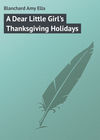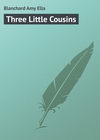Kitabı oku: «The Four Corners Abroad», sayfa 11
The conversation was not carried on without some difficulty, for Frau Pfeffer's Bavarian dialect was hard to understand, and Miss Helen was not very proficient in German. Nan had a better command of the language and was very quick, but even she found herself at a loss for a word very often, and oftener still, could not distinguish what Frau Pfeffer was saying.
Miss Helen and Nan walked home together after their visit, coming through an old part of the city, and happening upon various curious corners where old painted houses faced them, and where the crooked streets would have misled them if they had not carried a map. As they went along they planned what they should do for the Pfeffer family. Every Christmas for several years the Corners had tried to help some one who needed assistance, and they had been most fortunate in their efforts. The sad little picture of a forlorn child offering one meagre candle and a few broken flowers as a decoration for her mother's grave on All Saints day had moved them, although it was Jack who had really done the most to awaken the interest of the others. Jack, whom one would never suspect of such things, and who had given her family more anxiety and care than all the rest put together, yet it was she who, the year before, had given her Christmas stocking to a little lame girl in New York, for with all her thoughtlessness and her capacity for getting into scrapes, hers was the warmest heart of all.
That same day Dr. Woods came in, and was told the story which was at the moment the most interesting theme of conversation. He, too, thought it a case which should be given attention. "What we want to do," Nan told him, "is to find the father. Frau Pfeffer is quite sure he will return, but he may not be alive, though she firmly believes he is."
"Perhaps I can help there," said the doctor. "What is his name?"
"Hans Metzger."
"Where was he last seen?" Dr. Woods took out his note-book.
"He left Munich to find work."
"Do you know where he intended to go?"
"No, but perhaps his neighbors would know."
"I will inquire. Can you tell me what was his last address?"
"I can give you his sister's. No doubt she will know where he lived last."
"That will do. All right. I will start up a line of investigation at once. Perhaps among us all, we may get hold of a clue. And how goes the German, Nan?"
"It is a fearsome language," said Nan solemnly. "I wish you could have heard me trying to make Frau Pfeffer understand me, though I think I struggled harder, if anything, to understand her. Such a dialect! I don't see how they make it out themselves, and I don't see, either, how they master the German pure and – no, I can't say simple, for it is exactly the opposite."
"I admit it is pretty hard, and if I hadn't tackled it early, I would be in a regular fuddle now. But I took my grasp young, and have managed to hold on, as you will do."
"I don't know. I like French, or any of the Latin languages better."
"Yet there is a sort of rugged dignity about German which is very attractive. Its literature is very rich."
"I suppose so, and I may find its attractions later, but not when I am stumbling into pitfalls caused by declensions and constructions."
"If I can help you out at any time, don't fail to press me into service."
"I may keep you to that offer."
The other girls, including Juliet Hoyt, considered Dr. Paul much too elderly to be interesting, and at his appearance generally betook themselves to the Hoyts' rooms, where the more frivolous company of schoolboys suited their tastes. Nan, therefore, was often left to do the honors if her mother and aunt were not at hand, and Nan, be it said, did not consider it a hardship, for she liked Dr. Paul, and often when Mrs. Corner and Miss Helen returned from an early concert they would find the two laughing and talking together most happily. Nan liked the Hoyts and enjoyed the nonsense which went on in their sitting-room where there were seldom less than two or three boys, but her love of music was too real for her not wanting to escape from a series of dances banged out to rag-time measure.
"It is more than I can stand," she told Dr. Paul. "A little rag-time is jolly enough, and I am not so superior as to despise it altogether, but a whole evening of it is more than I can stand."
"Yet even that is better than some other kinds," responded Dr. Paul. "There happens to be a man at our pension who at home has the reputation of being an accomplished musician because he professes to play classical music. He comes from some small town, and his companions are evidently not among the elect. He does play execrably. I wish you could hear him."
"I don't," interrupted Nan laughing. "I know the kind. I suppose he will keep right on for the rest of his life as he has begun, varying his performance sometimes by bringing in a bit of improvisation, terrible improvisation which has no rhyme, reason, melody or anything else. I know such a person who blandly told me she sometimes altered Chopin and Beethoven to suit herself. Fancy! Oh, I know your man will cheerfully keep on, not knowing the difference between good music and bad, and because he has always associated with rag-time people who think any one who plays anything heavier than Hiawatha must have a standard so high that ordinary mortals cannot venture to criticise the performance."
"I perceive you are acquainted with the species. Yet, after all, I sometimes think it is a pity to know too much about music, for one certainly has a narrower range of enjoyment."
"But think of the quality of it."
"I wonder if it is really more than that of a man I used to know at college who would say, 'Give me a bag of peanuts and an interesting book and I'll enjoy myself.' Why, I read half of 'Les Miserables' at one sitting."
"For peanuts read candy, and you will have about the speech of a schoolmate of mine."
"Are you going to take up counterpoint and thorough-bass?" asked the doctor.
"Dear me, no. I don't aspire to composition. If I overcome technique and get in a little harmony I shall be doing well. I am doing intricate Bach things now, but I have an inspiring teacher and I don't mind the hard work. You should hear her play. Talk of temperament! I never saw anything like her."
"And I fancy Miss Nan Corner is not lacking in that particular."
"I believe Mr. Harmer used to think so, but I feel like a very automaton compared to Frau Burg-Schmidt."
"I haven't heard you play since you were at home last winter, but – "
"Then you wouldn't let me practice; you told me to frivol, I remember."
"You needed to frivol then. That is where it was a time to quench the fires of genius."
"I believe I have felt years older since that experience," said Nan thoughtfully, "and I am sure it is why mother does not want to leave us alone again. I believe you had something to say to that, too, Dr. Paul."
"You mustn't expect me to give away the secrets of my profession."
"Then it is about the only thing you aren't willing to give away," returned Nan laughing.
"Do you like stingy people?"
"Ask a Virginian that? Dear me, what are you thinking of? No, I suppose I am lacking in a proper admiration for thrift when I say that I would rather that a person were too extravagant than parsimonious."
"I shall never be a rich man, I am afraid," said the doctor with a half sigh.
"Comfort yourself with thinking about the deceitfulness of riches, and keep on being the generous man your father is, and you will be all right. Listen to my grandmotherly advice and remember that I have three younger sisters to deal with."
"And I have none."
"Then consider that Nan Corner is ready to be as sisterly as she knows how, for any better big brother than you are to us all, I do not care to see. Here come mother and Aunt Helen."
"And you have not played for me."
"You must wait till my joints are so limber that I can make my fingers form a right angle with the back of my hand; that is what I am aiming at now."
Then Mrs. Corner and Miss Helen came in and the doctor went forward to meet them.
CHAPTER XIV
"STILLE NACHT"
That Christmas was very near at hand was apparent by more than one outward and visible sign. "Though they don't begin to prepare for it nearly as early as we do," remarked Mary Lee.
"I think it is nicer not to," said Jack, "for there they begin so soon that it fools you into thinking it is very near when it is weeks off, and you get so used to seeing Christmas things that you forget they aren't there all the time."
"The first thing we must do to make us feel that Christmas is coming is to see the krippen," said Miss Helen.
"What are krippen?" asked Jean.
"They are representations of the Nativity, generally, though sometimes they represent other religious subjects such as the Flight into Egypt, or the heralding angels appearing to the shepherds. They are often very elaborate, and the best display of them is at the National Museum, where you can see fac-similes not only of German krippen but of Italian and Sicilian ones. The different churches also have them. There is one of the Advent now at the Theatinerkirche. You twins will be delighted with the little figures which are sometimes really wonderful."
They all started out the very next day to view the krippen, stopping first at St. Cajetans-Hofkirche on the Theatinerstrasse, where the children stood in awe and delight before the scene of John the Baptist preaching the coming of our Lord. The tiny figures were very perfect, the centurion soldiers and listening multitude were artistically grouped, a little brook of running water made a pleasant murmur as it wound its way along. It was not more than four inches wide, but it added much to the scene. The whole was lighted and stood out in strong contrast to the dim church in which it was enshrined. As Miss Helen dropped some pfennige into the cup ready for contributions a sepulchral voice in some dark corner murmured: "Gott sei dank."
Through the lower rooms of the Museum, where it was impossible not to linger a little to see the many curious and interesting things, the party took its way to the upper floor, where through a dark labyrinthine way they passed to find the lighted krippen set up on each side. There were a great many, and it took a long time to make the rounds. Some were quite simple; others were very elaborate. There were street scenes with every conceivable sort of figure, wonderful interiors and exteriors where the Wise Men were shown in all the pomp of Eastern magnificence; there were gardens and palaces, temples and churches, processions, and, above all, the rude stable with the manger and the Holy Family.
"They are the most marvellous things I ever saw," said first one and then another of the girls. "Such perfect little figures, such fascinating landscapes, such variety of expression and action, such typical costumes."
"The Sicilian ones are the best," decided Nan, "though those of southern Italy are about as good."
"I wouldn't have missed it for anything," declared Jo, as they came to the last one. "You are a duck, Miss Helen, to think of bringing us here. I am going to haunt the churches from now on to see how many krippen I can discover."
"Oh, can't we go back and do it all over?" asked Jean.
"Dear me," said Miss Helen, "I thought we had made a very careful examination of them all."
"But I do like them so much and I can't remember them all by seeing them just once."
"Perhaps we can come again," her mother comforted her by saying. "I think this must do for now, and there will be others in the churches."
"They will be changed quite often at the Theatinerkirche, I am told," said Miss Helen. "I believe there is a new krippe each week."
"Oh, there comes a new word. I suppose krippe is the singular and krippen the plural," said Mary Lee.
"Naturally. The word I find means literally a manger. We can see a very interesting display of krippen, Christmas ornaments and such things down on Sonnenstrasse and the Sendlingeethorplatz. The peasants make the little krippen and bring them in for sale just before Christmas."
"Oh, do they have them anywhere but in the churches?"
"Yes, indeed. A great many private houses have them and they are considered quite as much an institution in some families as the Christmas tree, though of course, these would be the Roman Catholic families. You can see them of all sorts and sizes. Munich is Roman Catholic, you know, although there are many Protestants here and many Protestant churches."
"I should love to have a krippe to take home even if I am not a Roman Catholic, mother," said Jean. "Couldn't we have one?"
"I don't see any reason for not having one, although it would be rather hard to pack. We will see about it."
"And may we go this afternoon to look at them?"
"Haven't you had enough krippen for one day? I think we'd better wait especially as the choice will be better a little later on," her aunt told her.
The Christmas trees were arriving, and as the party proceeded homeward they saw them being set up in their little stands, in every square and open space.
"They do everything here in such a nice pleasant way," said Nan, as she and her aunt walked through the forest of trees standing erect all along the Maximilianplatz. "At home now, they throw the trees in a pile or crowd them together in any old place. Here each tree looks as if it were really growing, and that this were an avenue of them growing just for Christmas. You can so easily see exactly how they look and can pick out what you like without any trouble. How good and Christmassy it smells, and what quantities of trees there are, then there are more coming. Can they sell so many, I wonder? The whole city seems to be full of them."
"When you consider that nearly every family in Munich will probably have a tree, you can imagine the number will be somewhat lessened by Christmas Eve." And true enough, as it proved, there was scarcely a tree left, at least on the Maximilianplatz, by the day before Christmas. More than one of the number went to the Pension Bauer, and one was purchased for the family of Frau Pfeffer.
Before this, however, there was the expedition to Sonnenstrasse to see the collection of Christmas-tree ornaments, krippen and such things which the country folk had brought for sale, and which were set out in small booths all along the street. Jean's fancy fell upon a tiny krippe which she and Jack bore away in triumph.
The days were very short and sunless, so that nightfall came very early, but in spite of that the streets were full of people who filled the big shops, or loitered along the streets, stopping leisurely before the windows to look in, and because it seemed the general custom for every one to go out as soon as it got dark, the Corner family followed suit.
"I suppose they do it to save candles," said Miss Helen. "There is German thrift for you."
"I think it is great fun," said Nan. "Why shouldn't they come out and look at the pretty things? The shop-windows are very attractive especially now, and some of the things are very cheap. I saw a fascinating silver chain on Sonnenstrasse, and it was ever so much cheaper than in other shops in more fashionable parts of the city. It is much handsomer, too. Jo and I gloated over that window."
"That was the one from which we had such difficulty in dragging you, wasn't it?"
"Yes, we saw so many pretty cheap things there, and we wanted to buy them every one. I'd love to give Jo that chain."
"How about giving it to Nan?"
"Oh, it's too expensive to give myself when all I can rake and scrape must go toward buying other things. If I can't get that special chain for Jo, there is another that I think will come within my limit and which she likes quite as well. Don't you love the way the men come sauntering along and stand before the windows? It gives one such a sense of leisure and real enjoyment of life to see them go dawdling about. That one we just passed is going to give his wife furs for Christmas, I know. He is looking at every piece in that window with a critical eye. Oh, Aunt Helen, do look. Did you ever see anything quite like that? A huge sausage dressed up with a huge satin bow, red satin at that, and there is a boiled ham pranked out with blue ribbons and artificial flowers. Truly schinken and wurst are dear to the German heart."
They were coming around by the Karlsthor to enter one of the big department stores where Nan had seen a certain book she wanted to get. "I would like you to see if you don't think it would be a good thing to give to Dr. Paul," she said to her aunt. "He has been so kind and good in so many ways, just like a big brother. I must give him something, and as he is very fond of dogs I thought I would get that funny book of dachshunds for him."
Miss Helen agreed that this would answer admirably.
"There are some dear little pieces of peasant pottery out on Turkenstrasse," Nan went on. "I think they are lovely. On the next street to the pottery shop are some queer wooden boxes which are made by the peasants, too. I want two or three of them. One I shall give to Juliet Hoyt, and a little jar to Mrs. Hoyt. I haven't decided what I shall give to Maurice."
"You certainly are finding out all the odd corners and out-of-the-way shops," said her aunt.
"I snoop around when I am coming home from my lessons, and Frau Burg-Schmidt told me about the boxes."
"I should like to see them, myself."
They decided that they would have time to hunt up the two shops, and continued their walk, coming home with mysterious packages which they refused to show to any one, and which they promptly stowed away with their other Christmas purchases.
From this out there was much whispering and many remarks, such as: "Nan and I are going out together this afternoon; you needn't come, Jean." Or, "Mother, would you mind not going with us to-day?" But there were other times when all must go together to select what was intended for Bertha Metzger and her little cousins. After talking the matter over Mrs. Corner and Miss Helen decided that it would be better for the girls to contribute from their regular Christmas money, and not receive any extra amount. "They will be much happier knowing the joy of sacrifice," Mrs. Corner said. "They are perfectly willing to go without a tree for themselves if we will furnish one for the Pfeffers, and each has agreed to be entirely satisfied with a modest present from her sisters, so as to have more to spend for Bertha."
"You are a wise mother, Mary," said Miss Helen. "I am sure the girls will enjoy their Christmas much more for having to exercise a little self-denial. I don't suppose I need be limited in making my gifts, need I?" she asked laughing. "You don't want to discipline me, do you?"
"I don't believe you need it," returned Mrs. Corner affectionately.
There were many interviews with Frau Pfeffer, and on the morning before Christmas Eve all five of the little Pfeffers with Bertha were sent to spend the day with a neighbor, and then the Corners took possession. The tree was set up and each had a hand in the trimming, the twins feeling very important, as this was the first time in their lives that they had been allowed to take part in such a performance. When it was finished they all stood off to see the effect of their handiwork.
"It's perfectly lovely," cried Jack ecstatically. "I'm glad we made up our minds to have this instead of one of our own, for it is much more fun to trim it for some one else."
"The little angel on top is beautiful," said Jean, "and that star on the very tip is so bright. Yes, I am glad they have the tree instead of us, but I am glad we can have our stockings, Jack."
Jack agreed that she would not like to give up the fun of hanging up her stocking, and they stood looking at the tree while Nan, Mary Lee and Jo were arranging the Christmas packages. Besides the warm clothes for each member of the family, there were toys and a basket of substantial food.
"Do put in something sweet and unwholesome," Nan had begged when her mother and aunt were packing the basket.
"Need it be unwholesome because it is sweet?" said Mrs. Corner laughing. "If they don't eat too much at once, I am sure it need not be."
"And please don't say we have given foolish things to the children," Nan went on. "The clothes are very important, but after what you and Mrs. Hoyt have given we think they ought to have toys. They are so cheap that they can have a lot. We have only one apiece from each of us."
"I don't think that will be too many," Mrs. Corner decided. "They will enjoy a few much more than an overabundance."
So the foolish toys were added, and stood in proper array with the more sensible gifts.
Railway switches must be turned even on Christmas Day, but Frau Pfeffer had a substitute on Christmas Eve, and could joyfully celebrate that holiday dear to the German nation. It was scarcely less dear to the party of Americans who gathered in Pension Bauer. That they might have more to spend on the Pfeffers they had agreed not to invest more than fifty pfennige on any but the Pfeffers, outside their own families, and it had been great fun to see what could be had for the small sum of twelve cents. But Munich was full of cheap and pretty articles, and the assortment was varied, Nan's peasant boxes and jars showing up finely. These presents were to be distributed on Christmas Eve, German fashion, while the family were to have their own celebration on Christmas morning, as they always did at home.
"You can't come into the sitting-room," said Miss Helen speaking through a crack in the door as the children returned from their morning at Frau Pfeffer's.
"You can't come in here," called Mrs. Hoyt poking her head out of the room on the opposite side of the hallway.
"Dear me! Where can we go? What secrets!" cried they all, only too glad there were such. "I suppose we can go into our own rooms," said Nan. "Come on, girls."
The odor of küchen filled the air, and there was an excitement in the frequent scurryings to and fro of the maids.
"Who all are coming to-night to help you celebrate?" asked Juliet Hoyt who joined the others in Nan's room after the work of tying up packages was finished, and it was nearing supper time.
"Dr. Woods; I think that is all," Mary Lee told her. "You see we are quite a party in ourselves, seven in all, and he will make eight."
"Four of Maurice's friends are coming," Juliet said, "so we shall be seven; that makes fifteen in all. Not a small number of Americans to get together. Of course Fräulein Bauer will have a tree. She has asked us all to come and see it, and she has been baking wonderful things, the maids say. Those silly boys, I know, have been spending every penny of their allowances on us."
"They shouldn't do it," said Nan severely. "We have only fifty pfennige presents for them."
"They would do it. Mamma tried to reason with them, but it was no use, and I suppose we shall be deluged with candy, flowers and books. Mamma laid down the law and told them we would positively accept no other kind of gift, and that she would countenance no extravagance."
"I am glad she did," said Nan. "It would be very embarrassing if they gave any of us handsome gifts."
"It is sort of fun to be in here talking about boys," remarked Jo. "It reminds me of our boarding-school days. I declare I could eat something good and homey this minute. It seems hours since we had dinner, and I have had a long walk since."
Nan jumped down from the bed, where she was sitting with her feet curled under her, and fumbled among some packages in a drawer, presently bringing out a bag which she tossed over to Jo. "There," she said, "that's all you'll get. You must save up for this evening for we are going to have an extra fine supper."
Jo opened the bag, fished out a pretzel and began to nibble it. "Just the thing to keep me occupied," she said, "and yet not too sustaining. Shouldn't you like to see the little Pfeffers when they discover the tree?"
"And Bertha," put in Jack.
"Bertha, of course; she counts in with the rest."
"Frau Pfeffer was so excited that I am sure she has been sending cars off on the wrong track all day," said Mary Lee.
"She is to leave at six and it is that now," said Nan. "Dear me, it seems much later for it has been dark so long. I wonder what she will do first, look at her presents or light up the tree."
"The first thing she will probably get something to eat, for she will be hungry, and so will the children. I suppose Bertha and the five will be standing waiting outside when she gets there," Mary Lee decided.
"But will she let them in till the tree is lighted?" said Jack. "It would be so much more of a surprise."
"We shall find out to-morrow, for I am sure we shall see some of them," said Nan. "It is really Christmas Eve for it is as dark as a pocket. Don't let's have any light. Froliche Weihnacht, girls! Now let's be cozy and do something to suit the season till we are called to supper. Jo, you're nearest the stove, just put a shovel or two of coal on that fire, so we can be good and warm. I don't think it has died down entirely."
Jo opened the door of the great tiled affair which stood in the corner, and peeped in. "I think there is enough left to start up again," she said as she threw on a few shovelfuls of coal. "I used to stand in such awe of these great porcelain stoves, or ovens, as they call them here, but they are not so bad, and when I get home I shall deny the report that one cannot keep warm in winter anywhere in Europe. I'm sure we have been warm enough. There, it is going ahead splendidly. What shall we do to be in keeping with Christmas Eve?"
"Suppose we sing Stille Nacht," suggested Juliet. And they began the good old German Christmas hymn, their young voices sounding sweetly to those busy in the next room. Then, as if answering, from the street below a band struck up the same air. The hymn was scarcely finished before Anna came along the corridor, knocking at each door to say: "Zu tisch, bitte," and they trooped out to the feast of good things which the Fräulein had prepared for this special occasion, and which was served earlier than usual since a second supper would be ready about nine o'clock.
The severe Miss Smart from Chelsea had departed to spend the holiday in the mountains, thither, too, the Herr doctor and his mother had gone, and the jovial German was taking supper with friends, so only the American contingency appeared at table. Herr Eckler was to return later, Fräulein Bauer told them.
"When can we go to the sitting-room?" asked the twins as they arose from the table.
"In a few minutes," Mrs. Corner told them.
"You must visit us when you have exhausted your own surprises," said Mrs. Hoyt, "and then we will all go and look at the Fräulein's tree."
The Corner children and Jo gathered around their door on one side the hallway; Juliet and Maurice with the four boys, who came in a bunch, on the other waited till at the word "Ready!" all rushed into the rooms opened to them.
"A tree after all!" cried the twins.
"Yes, it was the good Fräulein who sent it in all trimmed," Mrs. Corner told them, "and she has given us each one of these."
"These" proved to be wonderful gingerbread figures such as all had seen in bakeshop windows for the past fortnight, and which were really marvels of the baker's art. Then came the little presents from the Hoyts and their boy friends. For Nan a small glass with a München kindel upon it; a little can with the inscription "I hope you will enjoy your can o' tea (K-no-te)," this from Maurice, and from Juliet a photograph of Nan's favorite tenor. For the others were various gifts: wooden peasant boxes, little steins, queer figures, odd pictures. Jean had a whole German dinner in imitation, sausages, cabbage, cheese, fruit and cakes all set on the tiniest of plates and looking really good enough to eat. The schoolboys sent in a huge box of candies with a ridiculous little piano for Nan, a tiny dachshund for Mary Lee, a nest of the funny figures they called the "Spazieren-gehen family" for Jo. An invitation to a Christmas play at the Gärtnerplatz theatre signed by the four boys, fell to Jack's share, while for each, including Mrs. Corner and Miss Helen, were flowers.
A rap at the door interrupted the chatter. Juliet put in her head. "Come over and see our show as soon as you can," she said. "We don't want to put out the candles till you come." And all the children followed her leaving their elders to extinguish the candles on their own tree.
Another tree was lighted in the Hoyts' room, and other gingerbread figures stood prominently forth; the Fräulein had treated the Hoyts as generously as the Corners. More candy and flowers from the boys, a delightfully funny calendar for Juliet and a second nest of Spazieren-gehen figures.
The boys were having a great time over their own gifts. Nan and Mary Lee had set their wits to work upon a square wooden box, in the centre of which they had grouped four tiny Max and Moritz figures. These were securely glued on, and from each corner of the lid was a deeply grooved line burnt in the white wood. The inscription read: "From the four Corners to the four schoolboys." Inside the box were four rolls of the Christmas dainty known as mazapan which the girls had wrapped up in this brown paper to imitate sausages. This special sweet had been lately discovered, and the boys had all expressed a wish to taste it.
"Such clever people," said Henry Olcott. "We're going to toss up for the box and the fellow who gets it will be in luck, so he will have to treat the rest."
By the time the candles had burned down came a summons to the dining-room. Another tree met the sight of the children, and a table set out with cakes and a light punch. Herr Eckler had arrived and pretty soon all were dancing, Jack spinning around with the portly Herr in the roundest of round waltzes to the music pounded out by the Fräulein's brother. Dr. Woods arrived late, but joined in the dance, and later the whole party, except Mrs. Corner and the twins, went to the solemn and beautiful service at the Frauenkirche, a fitting close to a German Christmas Eve.

















